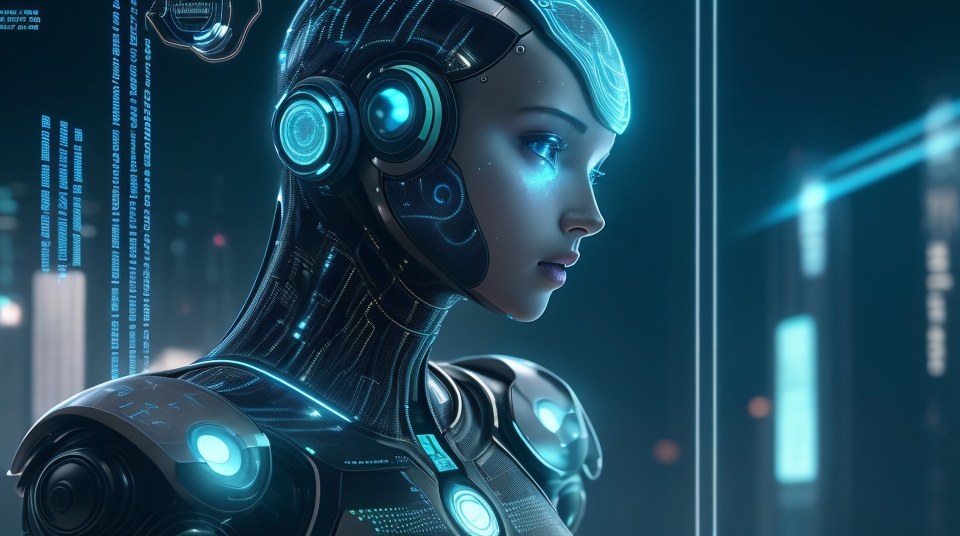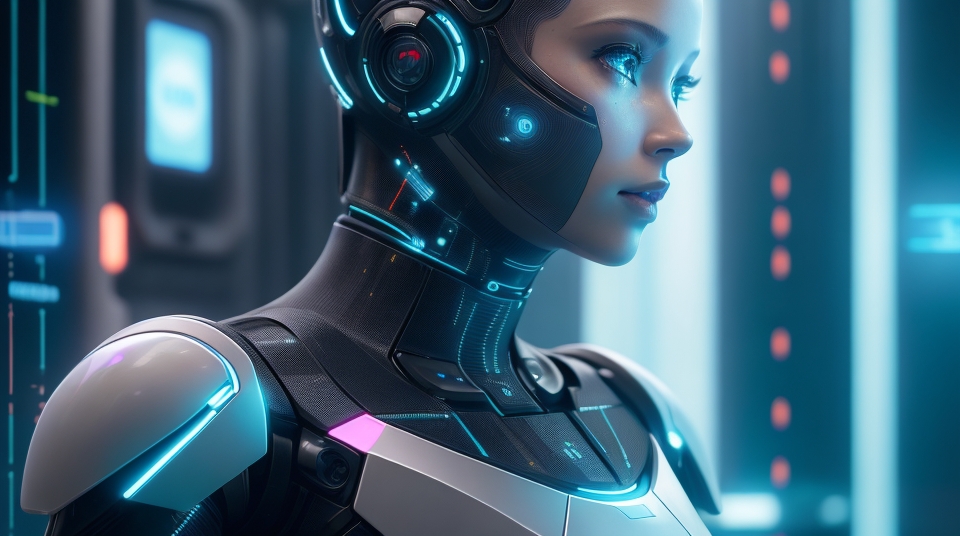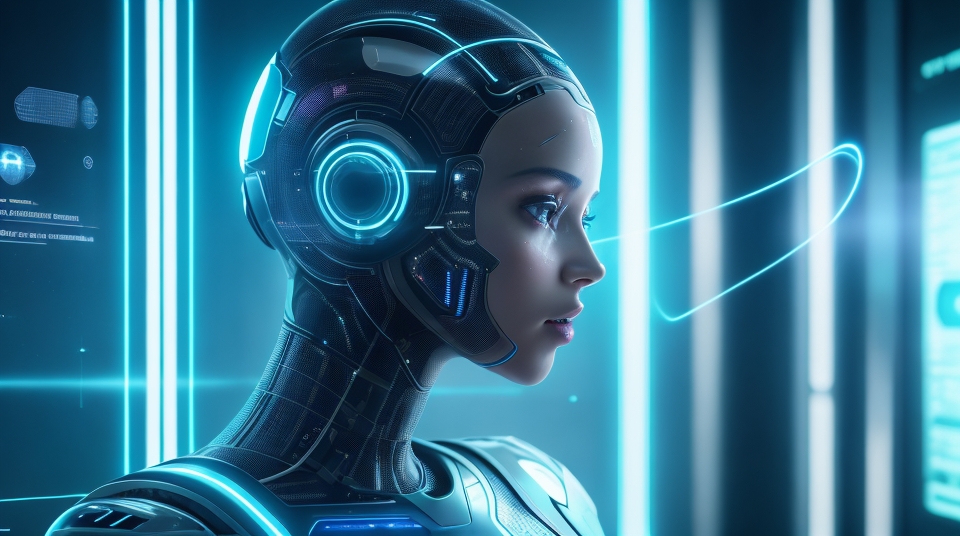AI for Improving Content Efficiency
In the ever-evolving world of content creation, Artificial Intelligence (AI) has emerged as a game-changer. AI refers to the simulation of human intelligence in machines, enabling them to perform tasks that typically require human intelligence, such as understanding natural language, making decisions, and learning from experience.
When AI is integrated into content creation processes, it holds the promise of enhancing speed, efficiency, and scale, transforming the way content is produced, distributed, and consumed.
AI and content marketing go hand in hand. Content marketing aims to create valuable and relevant content to attract and retain a target audience, ultimately driving profitable customer action. By harnessing the power of AI, content marketers can streamline their processes and optimize their strategies for improved content performance.
However, it is important to acknowledge the limitations of AI in content creation. While AI can automate certain aspects of content production, it lacks the creativity, intuition, and emotional connection that humans bring to the table. Therefore, it is essential to strike a balance between AI-driven efficiency and human creativity to achieve the best results.
AI-Powered Tools for Content Generation
AI-powered tools have revolutionized content generation, making it faster, more efficient, and scalable. These tools leverage Natural Language Processing (NLP) and Machine Learning (ML) techniques to understand and interpret human language, enabling machines to generate content autonomously.
NLP enables machines to comprehend and extract meaning from human language. It allows AI-powered tools to analyze the structure, sentiment, and semantics of text, assisting in content creation processes. ML, on the other hand, enables machines to learn and improve their performance over time based on patterns and data.
There are various AI tools available for content generation. One example is automated content creation platforms. These platforms use AI algorithms and templates to generate articles, blog posts, social media posts, and other forms of written content based on specific inputs and parameters. They can save a significant amount of time and effort for content creators, allowing them to focus on more strategic tasks.
Another example is chatbots, which utilize AI to simulate human-like conversations. Chatbots can interact with users, provide information, answer questions, and even assist in content discovery. They enhance user experience by providing instant responses and personalized recommendations, contributing to improved content efficiency.
However, it is crucial to evaluate the effectiveness of AI tools before integration. While AI can automate content creation processes, there may be instances where human expertise is required to ensure quality, creativity, and authenticity.
The Impact of AI on Content Production Efficiency
The integration of AI in content production has significantly improved efficiency. AI automates various aspects of content creation and curation, freeing up time for content creators to focus on more strategic and creative tasks.
One key area where AI improves content production efficiency is in automating content creation. AI-powered tools, such as automated content creators, can generate high-quality articles, blog posts, and social media content at scale. This automation eliminates the need for manual content creation, reducing the time and effort required.
AI also plays a crucial role in data analysis and audience targeting. By leveraging machine learning algorithms, AI can analyze vast amounts of data to identify patterns, trends, and audience preferences. This data-driven approach enables content creators to create more targeted and personalized content that resonates with their audience, leading to increased engagement and conversions.
However, it is important to be aware of the limitations and challenges of AI in content production. AI algorithms rely heavily on the data they are trained on. If the training data is biased or incomplete, it can lead to inaccurate content generation and audience targeting. Additionally, AI algorithms may struggle to capture the nuances of human language and emotions, impacting the overall quality and authenticity of the content.
AI and Content Strategy: A Data-Driven Approach
AI is transforming content strategy by providing valuable insights and data-driven decision-making capabilities. Content strategy involves planning, creating, distributing, and measuring content to achieve specific business goals. By utilizing AI, content strategists can optimize their approach and drive better results.
AI plays a vital role in keyword research, topic selection, and performance tracking. AI-powered tools can analyze vast amounts of data to identify popular keywords, trending topics, and gaps in the content landscape. This information helps content creators develop targeted content that resonates with their audience and improves search engine visibility.
Furthermore, AI can track and measure the performance of content through various metrics such as engagement, conversions, and click-through rates. This data-driven approach enables content strategists to identify successful content strategies, optimize underperforming content, and make data-backed decisions for content improvement.
The future of AI in content strategy looks promising. As AI technology continues to evolve, we can expect more advanced tools and algorithms that provide even deeper insights into audience behavior, content performance, and market trends. This will enable content strategists to stay ahead of the curve and adapt their strategies in real-time for maximum impact.
The Role of AI in Content Distribution and Audience Targeting
AI-powered content distribution is revolutionizing the way content reaches its intended audience. It enhances audience targeting, personalization, and content recommendation, making content distribution more efficient and effective.
By leveraging AI algorithms, content distributors can analyze vast amounts of user data, including demographics, preferences, and behavior, to identify the most relevant target audience. This enables them to personalize content distribution, delivering tailored content to the right audience at the right time. Personalization enhances the user experience, improves engagement, and drives conversions.
AI also plays a crucial role in content recommendation. AI algorithms can analyze user behavior and consumption patterns to recommend relevant content to users. For example, streaming platforms like Netflix and Spotify utilize AI algorithms to suggest movies, shows, and songs based on user preferences and viewing history. This not only improves the user experience but also increases content consumption and retention.
The future of AI in content distribution and audience targeting holds immense potential. As AI technology advances, we can expect even more sophisticated algorithms that can analyze real-time data and personalize content distribution on a hyper-personal level. This will enable content distributors to deliver a highly tailored and engaging content experience to each individual user.
Conclusion
AI has brought about a revolution in content creation, production, strategy, and distribution. It has significantly improved efficiency, speed, and scalability, enabling content creators to focus on more strategic and creative tasks. However, it is important to strike a balance between AI-driven efficiency and human creativity to ensure quality, authenticity, and emotional connection in content.
The integration of AI-powered tools in content generation has streamlined the process and reduced manual effort. AI algorithms, powered by Natural Language Processing (NLP) and Machine Learning (ML), enable machines to understand and create content autonomously.
AI has also transformed content strategy by providing valuable data-driven insights. It aids in keyword research, topic selection, and performance tracking, empowering content strategists to make informed decisions and optimize their strategies.
In terms of content distribution and audience targeting, AI enhances personalization, recommendation, and targeting capabilities. By analyzing user data, AI algorithms can deliver tailored content to the right audience at the right time, improving engagement and driving conversions.
As AI technology continues to evolve, we can expect even more advanced tools and algorithms that provide deeper insights and deliver a hyper-personalized content experience. The future of AI in content creation holds immense potential, and content creators and marketers can leverage this technology to drive better results and improve content efficiency.

Optimizing Content Quality with AI
AI can play a significant role in optimizing content quality by enhancing grammatical accuracy, ensuring semantic coherence, incorporating SEO elements, and striking the right balance between creativity and AI in content production.
One area where AI excels in optimizing content quality is in enhancing grammatical accuracy. AI-powered tools, such as grammar and spell checkers, can automatically identify and correct grammatical errors, spelling mistakes, punctuation issues, and stylistic inconsistencies. These tools leverage NLP and ML techniques to understand the context and provide accurate suggestions for improvement. By using AI tools, content creators can ensure high-quality content that is free from grammatical errors and typos.
In addition to grammatical accuracy, AI also helps in ensuring semantic coherence in AI-generated content. AI algorithms are trained on vast amounts of data, including well-written and coherent content. This training allows the algorithms to generate content that is not only grammatically correct but also semantically coherent. AI tools can analyze the context, structure, and semantics of the content, ensuring that it flows naturally and makes sense to the readers. This helps maintain the quality and credibility of AI-generated content.
AI can also assist in incorporating SEO elements for better rankings. By analyzing search patterns, keywords, and competition, AI can provide insights into effective SEO strategies. AI-powered tools can suggest relevant keywords, optimize meta tags, and analyze content structure to improve search engine visibility. This integration of AI and SEO ensures that content ranks higher in search engine results, driving organic traffic and improving content efficiency.
However, it is crucial to balance creativity and AI in content production. While AI can automate certain tasks and streamline the content creation process, it is important to maintain human creativity and originality. Content should not feel automated or generic but should reflect creativity and unique perspectives. Content creators should leverage AI as a tool to enhance their creativity rather than relying solely on automated content generation.
AI and Content Personalization
Content personalization is a key factor in delivering a tailored and engaging content experience to the audience. AI plays a vital role in understanding and matching audience preferences, enabling content marketers to deliver personalized content at scale.
AI-powered tools analyze vast amounts of user data, including demographics, behavior, preferences, and past interactions, to understand individual audience preferences. By leveraging machine learning algorithms, AI can identify patterns, trends, and preferences on a granular level. This allows content creators to generate content that matches the interests, needs, and preferences of their target audience.
Successful case studies of AI-powered content personalization showcase the power of this technology. For example, e-commerce platforms use AI algorithms to provide personalized product recommendations based on a user's browsing and purchase history. This personalized approach enhances the user experience, increases engagement, and drives conversions.
The future of personalization in AI-driven content marketing looks promising. As AI technology continues to advance, we can expect even more sophisticated algorithms that can provide real-time personalization for each individual user. This level of personalization will result in higher audience engagement, increased customer loyalty, and improved content efficiency.
AI in Content Analytics and Performance Tracking
Content analytics and performance tracking are essential for measuring the success and impact of content marketing efforts. AI plays a crucial role in analyzing and tracking content performance, providing valuable insights for content strategy adjustments.
AI-powered tools can analyze vast amounts of data, including user engagement metrics, conversion rates, click-through rates, and social media interactions. By leveraging machine learning algorithms, AI can identify patterns, trends, and correlations in the data, enabling content marketers to make data-driven decisions.
These AI insights play a vital role in content strategy adjustments. By understanding which types of content perform well, content creators can optimize their strategies to focus on high-performing content. AI can help identify content gaps and areas where improvements can be made, ensuring that content aligns with audience preferences and business goals.
Future trends in AI-powered content analytics hold great potential. As AI technology advances, we can expect even more advanced tools that can analyze real-time data and provide deeper insights. This will enable content marketers to stay ahead of trends, adapt their strategies in real-time, and continuously improve content efficiency.
Ethical Considerations in AI-Powered Content Creation
While AI offers significant benefits in content creation, it is essential to address the ethical implications and considerations that arise from the integration of AI in content marketing.
Understanding the ethical implications of AI in content creation is crucial. AI algorithms rely heavily on the data they are trained on, and if the training data contains biases or prejudices, it can lead to biased or inaccurate content generation. Content creators must ensure that the training data is diverse, inclusive, and representative of their target audience to avoid perpetuating biases or stereotypes.
Balancing AI efficiency and human creativity is another ethical consideration. While AI can automate certain aspects of content creation, it lacks the emotional intelligence, empathy, and creativity that humans bring to the table. It is essential to strike a balance between AI-driven efficiency and human-led creativity to ensure that content resonates with the audience on a deeper level.
Addressing plagiarism concerns in AI-generated content is also crucial. AI-powered tools can generate vast amounts of content quickly, making it easier to inadvertently use content that may infringe copyright or plagiarize existing works. Content creators must verify the originality of AI-generated content and ensure that it is legally and ethically sourced.
The future of ethical AI in content marketing lies in developing responsible AI algorithms, strong ethical guidelines, and transparent content creation processes. By being mindful of these considerations, content creators can leverage AI while upholding the ethical standards of content creation.
AI and Multilingual Content Creation
In an increasingly globalized world, multilingual content creation is essential to reach and engage diverse audiences. AI plays a crucial role in overcoming language barriers and enabling efficient multilingual content marketing strategies.
AI helps in multilingual content generation by leveraging NLP techniques that enable machines to understand and interpret multiple languages. AI-powered translation tools can automatically translate content from one language to another, ensuring accurate and coherent translations. These tools are continuously improving and can provide high-quality translations that save time and resources for content creators.
Successful case studies of multilingual AI content campaigns highlight the effectiveness of this approach. For instance, global brands utilize AI-powered tools to generate multilingual content for their websites, social media channels, and marketing campaigns. This enables them to communicate with their global audience in a language they understand, fostering engagement and brand loyalty.
The future of AI-powered multilingual content creation holds immense potential. As AI technology evolves, we can expect more advanced translation tools that provide real-time translations, overcome linguistic nuances, and deliver personalized content experiences in multiple languages. This will enable content creators to expand their reach, engage diverse audiences, and improve content efficiency worldwide.
Conclusion
AI has the power to significantly enhance content efficiency and performance. By optimizing content quality, delivering personalized experiences, tracking performance, addressing ethical concerns, and enabling multilingual content creation, AI empowers content creators and marketers to reach, engage, and convert their audience more effectively.
AI-powered tools assist in enhancing grammatical accuracy, ensuring semantic coherence, and incorporating SEO elements to improve content quality. Content personalization is made possible by leveraging AI to understand and match audience preferences. AI-driven content analytics provide valuable insights for content strategy adjustments, while ethical considerations ensure responsible and unbiased AI use. Finally, multilingual content creation is expanded through AI-powered translation tools, enabling effective communication with global audiences.
As AI technology continues to evolve, content creators and marketers must stay informed and adapt to the latest AI trends, tools, and practices. By leveraging AI for improving content efficiency, they can stay ahead of the competition, drive better results, and deliver exceptional content experiences to their audience.

AI Automation Agency Services: Enhancing Efficiency and Productivity in Content Creation
AI automation agency services have emerged as a valuable solution for streamlining content creation processes and enhancing efficiency and productivity. These services leverage the power of AI to automate various tasks involved in content creation, allowing content creators to focus on more strategic and creative aspects of their work.
With the help of AI automation agency services, content creators can save a significant amount of time and effort. These services utilize AI algorithms and machine learning techniques to perform tasks such as generating content ideas, conducting research, and even writing content autonomously. By automating these time-consuming tasks, content creators can streamline their workflow and produce content at a much faster pace.
Authority Websites
AI automation agency services are especially beneficial for the creation of authority websites. Authority websites aim to establish expertise, credibility, and trust in a particular niche. AI algorithms can analyze vast amounts of data related to the niche, identify trends and patterns, and generate well-researched and informative content. This helps content creators build authoritative websites that resonate with their audience and position themselves as industry leaders.
Social Media Posts
Furthermore, AI automation agency services can also assist in creating engaging social media posts. Content creators can input relevant information into AI-powered tools, and the algorithms can automatically generate engaging social media content that is tailored to the platform and target audience. By automating the content creation process for social media, content creators can maintain a consistent presence across various platforms and optimize their social media strategies.
Feature Images
Another area where AI automation agency services excel is in the creation of feature images. Visual content plays a crucial role in capturing the attention of online audiences. AI algorithms can analyze the content and generate visually appealing and relevant images that align with the overall messaging. This saves content creators the time and effort of manually creating or sourcing images, allowing them to focus on other critical aspects of content creation.
AI-driven apps
AI-driven apps are also becoming increasingly popular in the content creation space. These apps leverage AI algorithms to automate various tasks, such as content editing, proofreading, and content distribution. Content creators can use AI-driven apps to enhance the quality of their content, ensure grammatical accuracy, and even optimize their distribution strategies.
In conclusion, AI automation agency services have revolutionized content creation by enhancing efficiency and productivity. These services automate various tasks involved in content creation, such as generating content ideas, conducting research, and even writing content. They can be particularly beneficial in the creation of authority websites, generating engaging social media posts, creating feature images, and optimizing content through AI-driven apps. By leveraging the power of AI, content creators can streamline their processes, save time, and deliver high-quality content to their audience.

FAQs
Here are some frequently asked questions about using AI to improve content efficiency:
How can AI improve content efficiency?
AI can improve content efficiency in various ways. It can automate content creation processes, such as generating ideas and writing articles, saving time and effort for content creators. AI tools can also analyze data to provide insights for content strategy adjustments, optimizing the content for better performance. Additionally, AI enables personalization and audience targeting, ensuring that the right content reaches the right audience at the right time.
What are some examples of AI-powered tools for content generation?
There are several AI-powered tools available for content generation. One example is automated content creation platforms that use AI algorithms to generate articles and blog posts based on specific inputs and parameters. Chatbots are another example of AI tools that can interact with users, provide information, and assist in content discovery. AI-powered recommendation engines also play a crucial role in suggesting relevant content to users based on their preferences and behavior.
Are there any limitations to the use of AI in content creation?
While AI offers significant benefits, it also has its limitations in content creation. AI lacks the creativity, intuition, and emotional connection that humans bring to content. It may struggle to capture nuances of human language and emotions, impacting the authenticity and quality of the content. There is also a need to ensure that AI is trained on diverse and unbiased data to avoid perpetuating biases or stereotypes in the content generated.
How can AI optimize content for better search engine rankings?
AI can help optimize content for better search engine rankings by analyzing search patterns, identifying relevant keywords, and suggesting improvements. AI-powered tools can optimize meta tags, analyze content structure, and provide recommendations for SEO strategies. By incorporating AI in the content creation process, content creators can improve search engine visibility and drive organic traffic to their websites.
What role does AI play in content personalization?
AI plays a crucial role in content personalization by analyzing user data and preferences. It helps content creators understand individual audience preferences and generate tailored content that matches their interests. AI-powered recommendation engines can suggest personalized content based on user behavior, enhancing the user experience and increasing engagement. By leveraging AI for content personalization, content creators can deliver a more personalized and engaging content experience to their audience.


